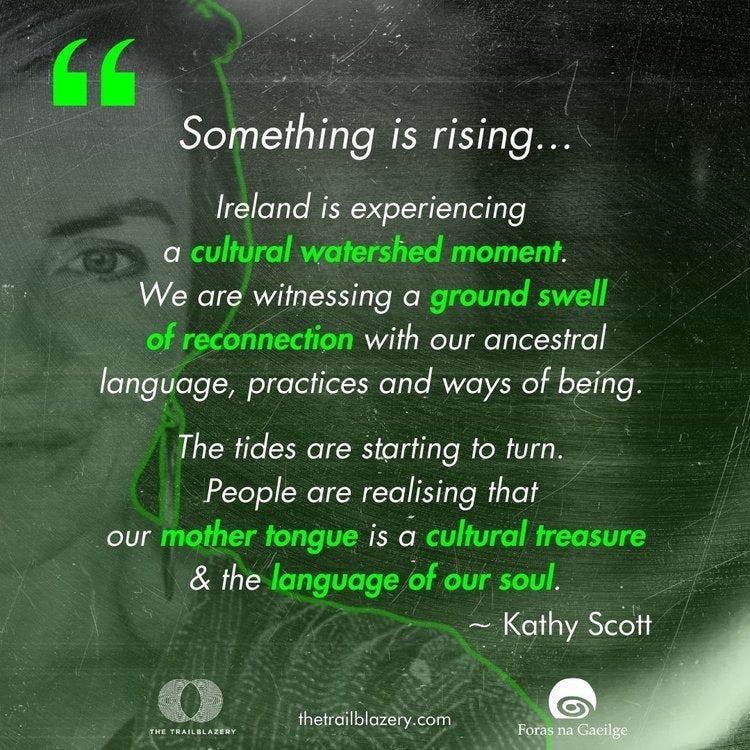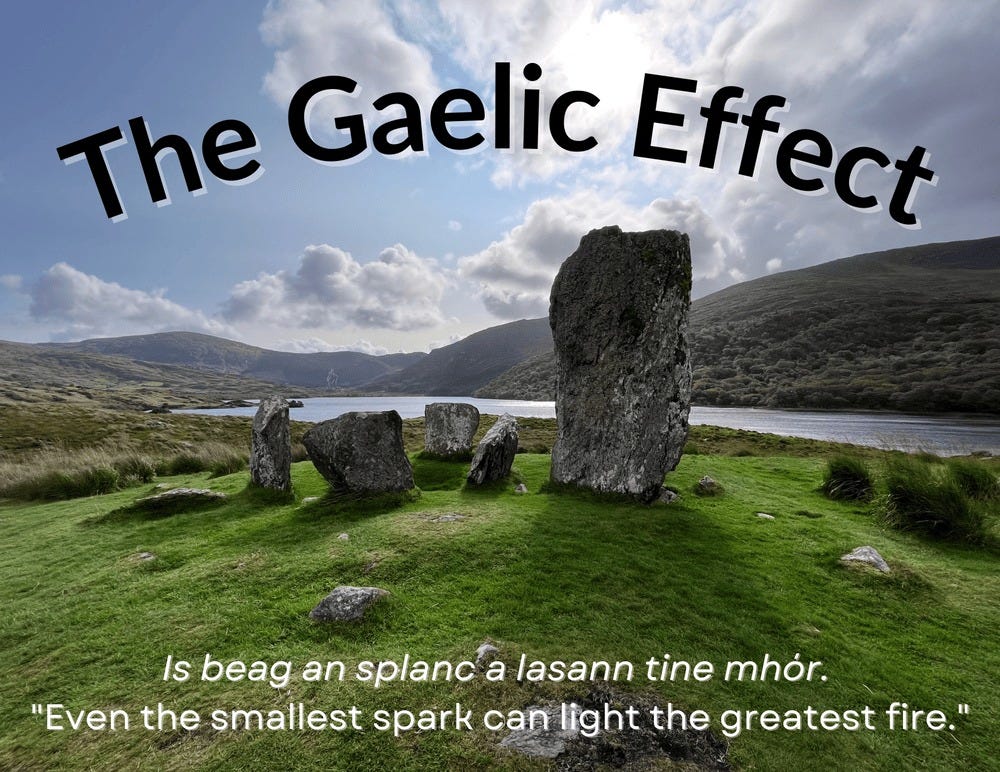“When you speak in Irish, every word is a tiny poem that reveals a new perspective.” — Hector Ó hEochagáin
Failte go dtí An Éifeacht Ghaelach! Welcome to The Gaelic Effect!
First, a friendly reminder: Scoil Scairte (the Hedge School) starts tonight. Haven’t registered yet? No worries—you’ll get a recording of every class and the live language practice starts Tuesday. Paid subscribers to The Gaelic Effect get 10% off. Learn more about this inspiring program that I and others love, here.
And now it’s time for this week’s Gaelic Effect—more lingustic archeology. Enjoy—and let me know what you think in the comments below!
“We can never make anyone do anything against their will without enormous consequences.” — Marshall B. Rosenberg
The death of goodwill
One of the core concepts of Nonviolent Communication (NVC) is that our communication—and even our intentions—be free of demand. Demands are the deathbed of collaboration and good will. They foster resentment, power-over and drive people to make choices out of fear rather than intrinsic motivation or connection to their own values and needs. Marshall Rosenberg often asked two questions: “What do you want someone to do? And why do you want them to do it?” We usually focus on the “what” in our overwhelmed and busy days. But the “why” is even more important, especially in fostering healthy relationships. Punishment, pressure, guilt or shame may seem effective (and familiar) ways to get things done—for example, to get your kids to finish their homework or do their chores. But why you want them to do these tasks? I imagine it’s because you value mutual support and contribution in the home (a micro meitheal); appreciation for learning, and holding long-term vision and goals for their lives. This is very different from “do this —or else!”
In the last Gaelic Effect, A True Feeling, I wrote about how “sorry” in Engish is in a sorry state, devoid of any genuine feeling. It’s either guilt-ridden or shame-inducing (“Say you’re sorry!”) or a throw-away phrase (“er…sorry about that”) that minimizes any real awareness or responsibility for the impact of our actions. As a result, “sorry” is disconnecting—and often even dismisive—rather than restorative or healing. “Should” thinking (and its sibings in English—“ought to,” “have to” and “must”) are not far off from “sorry” in this regard. They all come from a place of power-over, even when said in relation to ourselves (“I really shouldn’t be going to bed this late…and I should be exercising more!”). Marshall observed, “As long as I think I ‘should’ do it, I’ll resist it, even if I want very much to do it.” As human beings we value autonomy and choice, even in relation to ourselves. When we use words like “should” or “ought to,” we are distancing ourselves from our own needs and what truly motivates us.
“Avoid ‘shoulding’ on others and yourself!” — Marshall B. Rosenberg
Under obilgation
As I’ve explored in earlier editions of The Gaelic Effect (see Debt or Abundance, for example), numerous expressions in English—including ones that seem civil and innocuous, such as “please”—have their origins in financial debt and the fear of imprisionment. In English you can express gratitude by saying, “I am indebted to you,” but I doubt many English speakers reflect on what this originally meant: that I literally owe you. This is a power-over dynamic in multiple ways: class/status, economic resources, and even choice and control over what happens to our bodies.
“Should” and “ought” have similar origins in English. “Should” comes from the Old English sceal, Northumbrian scule: "I owe/he owes, will have to, ought to, must," […] from skulanan, and a common Germanic […] verb meaning "to owe or be under obligation"). This is […] related, via a past tense form, to Old English scyld "guilt," German Schuld "guilt, debt;" also Old Norse Skuld. These Germanic words are reconstructed (Watkins, Pokorny) from a PIE root *skel- "to be under an obligation." Cognates outside Germanic include Lithuanian skelėti "to be guilty," skilti "to get into debt;" Old Prussian skallisnan "duty," and skellants "guilty." (Etymonline) Perhaps since being in debt was a crime, “should” came to mean “guilty.”
“The most dangerous of all behaviors may consist of doing things ‘because we’re supposed to.’” Marshall B. Rosenberg
“Should” was originally the past tense of “shall;” “shall” also meant obligation but now refers to futurity. Yet we can still see the shadow of this original meaning when “shall” is used as a kind of demand: “You shall do as your told!” This communicates obigation and enforcement—making someone do something (the ultimate form of power-over). Similar to “should,” originally meaning to be literally in debt or under obligation, “ought” comes directly from “owe:” “Old English ahte "owned, possessed," past tense of agan "to own, possess; owe." […] In Middle English, it meant "possessed" and "under obligation to pay." [Etymonline]
Yuck.
We use these words (and the thinking behind them) everyday in English without being aware of their current and original meanings—and implications. Who wants to be indebted to someone else, literally or metaphorically? Who wants to do anything out of pressure, force or coercion or obligation? What kind of world does this create for us—and our children?
What’s “right” in the world
Ready for something radically different? In Irish, there is no word for “should.” Take that in for a moment. There literally is no word for “should.” The only way to remotely approach this English-language concept (of debt, obligation, guilt and shame) is through a phrase—although as we’ll see, this phrase has none of the same connotations or implications of “should.” In fact, it’s the opposite.
The closest translation of “should” into Irish is to say, “It is right for me:” Is ceart dom. Or, if you’re “shoulding” someone else, “It is right for you:” Ba cheart duit. For example, “I should feed the cat,” translates into Irish as, Ba ceart dom an cat a bheathú (It would be right for me to feed the cat). Ba cheart dúinn na cánacha a dhéanamh (We should get the taxes done) literally means, “It would be right for us to get the taxes done.” Níor cheart duit é sin a rá (You shouldn’t say that) means in Irish, “It’s not right for you to say that.” This is not “right” in a moralistic sense, as in right/wrong or “correct” (or not). It’s more akin to when we say in English, “All is right in the world.” In this context, ceart means fitting or appropriate, sound or just. Rather than an obligation or demand—coming from an external source, pushing in from the outside in, this expression of “should” in Irish grounds you in your core: What is right or just, right now? What is right/best for this situation? “It is right for me” (or not)? This invites in self-connection, grounding and discernment rather than obligation or demand.
A key element in this phrase is the use of the preposition do (for). In other phrases in Irish, ceart can mean “correct” as in, sin ceart (“that’s right”) or "you are right,” Tá an ceart agat (literally, you have the right/rightness at you). Or ceart go leor—”o.k.” or literally “right enough” or “all right.” Yet in this Irish “should,” do brings in the element of what is “right” “for me” (dom) or what is “right for you” (duit). Given that prepositions conjugate in Irish, this becomes even more potent and amplified, as expressed in one word: dom (“for me”), duit (“for you”), dúinn (for us). The word ceart in Irish comes from Old Irish, cert, from Latin, certus (settled, certain, firm). In Modern Irish, it can mean “right or correct” ( as in sin ceart) and also “just, fair, rightful” and “true, honest or authentic.” (Wiki) It’s these latter meanings that we see in ceart + do. What is right for me, in this moment? What is “rightful” or true for you? Or him or her? Again, this is very different from “should” in English, and its etymology. Unless you know what ceart + do means in Irish, this radical difference is completely lost in translation.
Another way to say “should” in Irish is to use the word cóir, which also means “right.” For example, you can say, Níor chóir go mbeifeá ag mothú ciontach (You shouldn’t feel guilty—or literally, it’s not right to.) Or Cad é ba chóir dom a rá? (What should I say? Or literally, “What is right with me to say?). (Focloir) Cóir has a similar etymology to ceart as well. It comes from the Proto-Celtic kowwaris (“just, rightful”) and from kom- (“with”) + wīros (“true”). (Wiki) In current Irish it means “just, proper, decent and honest.” You can see these meanings in other uses of the word cóir such as, Is cuí agus is cóir sin (it is right and proper) or an chonair chóir (the path of righteousness) or feibh is cóir (as is just). (Teanglann) Again, the etymology and meaning of ceart and cóir couldn’t be further from the meaning of “should” or “ought” in English. The gulf between these two concepts—and that this is the standard translation of “should” into Irish—shows just how gaping the difference is between these two language-cultures.
So I think you should look ahead, Ba chóir duit féachaint romhat (it’d be right for you to look ahead). What kind of world is true and just for you? How do you want to share power and inspire and motivate others—via the English-language world of “should” (of obligation, indebtedness, domination and demand) or a world grounded in what’s just and right and true? You can choose.
For now, it is “right with me” to thank you for reading.
Dian, i mBaile Atha Cliath (in Dublin)
P.S. Friendly reminder for Irish learners: words as Gaeilge in the text above are hyperlinked to abair.ie so you can hear the pronunciation in the dialect of your choice.
You can also support The Gaelic Effect and its mission by making a one-time donation by clicking anseo (here).










I first heard the word "Cóir" on the Story Archeology podcast, years ago. Those two scholars explore it in its use in myth, as the "rightness" that was necessary of a king's behavior, else the goddess (land) withdraw her favor. I've also heard it expressed as "kinship with the earth" which is the meaning used in a video I made about poet Ella Young. https://youtu.be/sNG9qX0QJSg?si=RX43OdBRoJ_28sj7
English is a language created by people separated by class and culture, who, by necessity, needed to get along after the printing press began to share knowledge and commerce across boundaries. Little wonder it is a language with oppression baked inside.